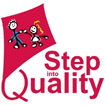Safeguarding and Child Protection
At Huncoat Primary School we believe that everyone who comes into contact with children & their families has an important role to play in safeguarding children.
The School's Designated Safeguarding Lead is - Mrs R Dickinson - Head Teacher and our Deputy Safeguarding Leads are - Mrs Langley- Deputy Head Teacher and Mrs Alldritt - Pastoral Support
The School's Designated Mental Health Lead is - Mrs R Dickinson
School has a pastoral phone - please request the number from the office. You can use this phone if you have any concerns, need support or help - you can contact us at any time
All staff have a responsibility to provide a safe environment in which children can learn. All staff have a responsibility to identify children who may be in need of extra help or who are suffering, or are likely to suffer significant harm. All staff then have a responsibility to take appropriate action, working with other services as needed, this will include contacting relevant services if need be: Early Help Assessment Team/ Child Social care.
Every member of staff receives annual training on Safeguarding and Child Protection policies and procedures and additional training on aspects such as online safety, PREVENT (the Governments approach to stopping radicalisation) and other current issues. Regular training throughout the year helps staff stay intouch with changes/ concerns/ new developments.
Every staff member is aware of the system within Huncoat Primary School which support safeguarding – these are explained as part of staff induction and are reinforced at regular intervals. This includes our Child Protection Policy, Staff Code of Conduct, and the role of the D.S.L (Designated Safeguarding Lead), Whistleblowing, Record Keeping - CPOMs
Please click on the links below, in particular “Keeping Children Safe in Education” this document refers to management of safeguarding in schools.
Staff are aware of the signs of abuse and neglect and maintain an attitude of ‘it could happen here’ where safeguarding is concerned.
If staff have concern about a child they will raise these with Mrs Dickinson, the Head Teacher/ D.S.L. We believe children and families have the right to receive the right to help at the right time to address risks and prevent issues escalating. Concerns should always lead to help for the child.
Staff and volunteers must feel able to raise concerns about poor or unsafe practice and potential failures in the school’s safeguarding regime. Huncoat Primary School’s whistleblowing procedures are regularly reviewed and updated to ensure such concerns are raised with the management team.
Click here to read:
Keeping Children Safe in Education September 2022
Key Phone Numbers/emails:
Police: 111/999
Emergency Duty Team: 0300 123 6722
NSPCC: https://www.nspcc.org.uk/

https://www.nspcc.org.uk/what-is-child-abuse/types-of-abuse/domestic-abuse/
For parents
If you're an adult experiencing domestic abuse, there are organisations that can help.
- Relate
0300 003 0396
You can talk to Relate about your relationship, including issues around domestic abuse. - National Domestic Violence Helpline
0808 2000 247
A 24 hour free helpline run in partnership between Women's Aid and Refuge. - Men's Advice Line
0808 801 0327
Advice and support for men experiencing domestic violence and abuse. - National LGBT+ Domestic Abuse Helpline
0800 999 5428
Emotional and practical support for LGBT+ people experiencing domestic abuse
How Childline can help
We understand how difficult it is for children to talk about domestic abuse. Whether it's happening now or happened in the past, Childline can be contacted 24/7. Calls to 0800 1111 are free and confidential. Children can also contact Childline online.
Adverse Childhood Experiences (ACEs) are stressful events occurring in childhood including:
- domestic violence
- parental abandonment through separation or divorce
- a parent with a mental health condition
- being the victim of abuse (physical, sexual and/or emotional)
- being the victim of neglect (physical and emotional)
- a member of the household being in prison
- growing up in a household in which there are adults experiencing alcohol and drug use problems.
Adverse Childhood Experiences - ACEs and Health:
An ACE survey with adults in Wales found that compared to people with no ACEs, those with 4 or more ACEs are more likely to:
- have been in prison
- develop heart disease
- frequently visit the GP
- develop type 2 diabetes
- have committed violence in the last 12 months
- have health-harming behaviours (high-risk drinking, smoking, drug use).
When children are exposed to adverse and stressful experiences, it can have a long-lasting impact on their ability to think, interact with others and on their learning.
ACEs should not be seen as someone’s destiny. There is much that can be done to offer hope and build resilience in children, young people and adults who have experienced adversity in early life.
Please look at the video, links and documents below to see how you can find out more and support someone with ACEs.










